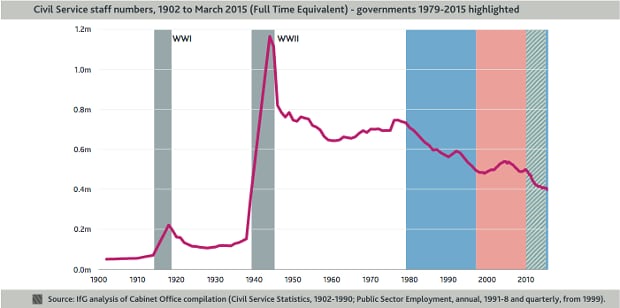There are two separate effects caused by making it easier to process paperwork. The one that you identified is that it takes less work to process the paperwork that had been required previously. The other effect is that it makes it easier to add more paperwork. If they add enough additional paperwork requirements, that offsets the reduction in the effort to process the old requirements.
Another problem is that an increased ability to produce paperwork works for both sides. It's easier for the criminal to produce fake paperwork. So the government needs more paperwork to check that the paperwork is valid.
Before computers, you would have to store all that paper as paper. Huge, giant file cabinets. With computers, you can store much more paperwork. Scan it in and one hard drive can hold a file cabinet's worth of paperwork. With eFile, you may not even have to scan the paperwork.
TL;DR: there's more paperwork now than there was before computers.
Even services like the police could be reduced in numbers since you can now monitor an entire city from a single office, rather than relying on ever-present foot patrols.
This is completely backwards. The point of foot patrols is not to "monitor" the city. We haven't needed that since phones became omnipresent. The point of foot patrols is to show presence. So criminals go, "Oh, I just saw a police officer. Maybe now isn't the best time to steal that lady's purse." Or deal drugs. Or whatever. We still don't have a technology that really replaces that (although there is some work on security robots).
That's another problem with viewing technology as simplifying things. A side effect of foot patrols was that people could report crimes directly to the foot patrols. But the real purpose was to signal to people that the police cared. If you entirely take away the monitoring role from the police, there is still a need to signal caring.
In addition, any response to monitoring requires police. The foot patrols mean that there are officers right there. What do officers do when there aren't calls? Hide in some remote location? Or openly patrol the city, on foot?
Most aspects of life that can be automated are just part of the process. Even if you take away the entirety of the portion that can be automated, we still have the other portions. And many times, the other portions are nearly as much work as before the automation.
Take water samples for an example. We can automate pouring the water into a testing machine. We can automate printing out and distributing the reports. But what we can't automate is having a trusted person drive out to the location that needs tested, collect the water, and send it to the testing location. Even if we could automate that, we can't automate checking that the automating equipment hasn't been compromised. Pull the equipment out of the stream and put it in a bucket instead. Then you can produce as much pollution as you want. The automation happily generates reams of fake paperwork.
To fix that, we send a person out to the location who checks that the sensor is in the stream and not a bucket. That person tests the sensor and puts it back. Then takes a water sample, labels it, and sends it to the testing location. Which of course is exactly the job that we were trying to automate away. Worse, a significant portion of that job is travel. And travel isn't helped much by skipping every other location.
Net effect of technology:
- Expensive new equipment.
- Increased reach (more samples taken).
- Modest decrease in people doing the original job, as auditing the remote results takes a substantial portion of the work.
- New work is required to maintain the automation.
We had a similar issue with gasoline. Gasoline efficiency (measured in gallons per mile) doubled. But gasoline usage stayed the same. People used the same amount of gasoline but increased their commute distance instead.
Increased efficiency doesn't necessarily lead to decreased usage. It only does so if we are satisfied with the same output.
